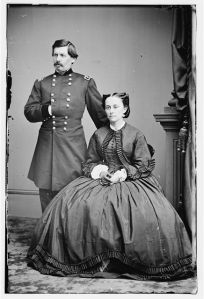It wasn’t that the Union Army wanted to emancipate the slaves during the Civil War. Union soldiers as a class were racists, as were most Northerners of the day.
“Union soldiers were not on a great crusade to end slavery,” Gary Gallagher, a professor with the University of Virginia’s Corcoran Department of History, said. Rather, they were on a crusade to take down the “aristocrats and oligarchs” who owned the plantations and ruled the South. Gallagher compared the Union soldiers’ attitudes toward Southern plantation barons to the Founding Fathers’ attitude toward the British during the Revolutionary War. Southerners were nose-in-the-air snobs who thought they were better than the common American.
If ending slavery ended the Southern oligarchy, then the means justified the end.

Portrait of Maj. Gen. George B. McClellan, officer of the Federal Army, and his wife, Ellen Mary Marcy
Gallagher provided the opening lecture for the U.S. Capitol Historical Society’s 2011 Annual Symposium: “Emancipation during the Civil War,” in the U.S. Senate Dirksen Office Building on May 5. (Yes, I know. That was more than two weeks ago. Thank you, God, for not ending the world yesterday or this NEVER would have seen the light of day.)
Gallagher’s lecture, “’Wherever Our Army Has Been, There Remain No Slaves’: Union Military Forces in the Equation of Emancipation,” gave more than a nod to the two prevailing theories in the “very complex process of emancipation.” But, he argued, without the Union Army slavery would not have been abolished by the Civil War.
The two main trains of historian thought on emancipation are:
1) President Abraham Lincoln freed the slaves, with supporting roles from Congress and Gen. Ulysses S. Grant.
2) The slaves freed themselves through uprisings and revolts.
Even among those two, though, Lincoln carries the day. Growing up, Gallagher remembers, the refrain was, “Lincoln freed the slaves. Lincoln freed the slaves.” However, Lincoln himself gave the Union Army much credit in his Second Inaugural Address, Gallagher said, when he declared:
“The progress of our arms, upon which all else chiefly depends, is as well known to the public as to myself, and it is, I trust, reasonably satisfactory and encouraging to all,” adding that the “slaves constituted a peculiar and powerful interest. All knew that this interest was somehow the cause of the war.” (Ha! So the Civil War was fought over slavery.)
But emancipation was not pre-ordained nor was it Lincoln’s goal when war began, Gallagher said. (OK, so the Civil War was fought to preserve the Union.) In theory, had Union Army Gen. George McClellan not been a timid warrior and had successfully marched on and captured the Confederate capital of Richmond, Virginia, in the summer of 1862, the North would have won the war without ending slavery, Gallagher proposed. McClellan was no fan of abolition.
But McClellan failed and slavery slipped away. Gallagher gave many examples of how slavery disappeared as the Union Army advanced, remained where the army had not reached, and returned when Confederate troops retook Southern territory.
“Slavery was virtually untouched in Texas because Texas was virtually untouched by the Union Army,” he noted. The Union Army’s presence in Harpers Ferry, West Virginia, meant slavery did not exist there. In fact, on May 4, 1861, Harpers Weekly noted that while the Union Army did not “march under an abolition banner,” in the lands occupied by the Union Army marshal law superseded local, state and federal law – and the Fugitive Slave Act was not to be found in military regulations. Therefore, having no legal recourse to keep slaves in bondage, the Army’s presence gave slaves de facto freedom.
Conversely, when Confederate Gen. Stonewall Jackson overtook Harpers Ferry, hundreds of freed African Americans again became enslaved. Southerners rejoiced, Gallagher said, at the recovery of their “contraband.”
Drawing another comparison between the Revolutionary and Civil Wars, Gallagher noted that the British also freed the slaves in the territories they occupied. Had the British won the Revolutionary War, slavery probably would have ended then in the American colonies.
The British lost and it was left to the Union soldiers of the next century to complete the mission. Soldiers knew their role in emancipation. Robert Gould Shaw, a well-connected white colonel who commanded the African-American 54th Massachusetts Regiment, wrote his mother downplaying the effect of Lincoln’s Emancipation Proclamation. “For my part, I can’t see what practical effect” the proclamation has, he wrote. “Wherever our army has been, there remain no slaves. The proclamation will not free them where we don’t go.”
Shaw won a measure of notoriety by Matthew Broderick’s portrayal of him in the movie Glory. But he is not a household name.
Abraham Lincoln is. So, regardless of the Union Army’s role in emancipation, Lincoln will forever be credited for freeing the slaves. That may not be fair, but it is historical fact.
Tom Pfeifer is the managing partner and chief strategist for Consistent Voice Communications. Reach him at Tom@YourConsistentVoice.com.
